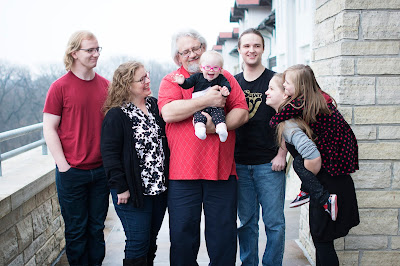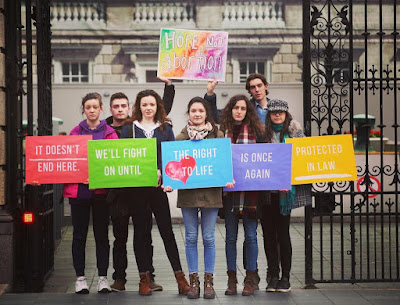A Beacon of Hope: Abortion Advocates Admit Roe’s Days are Numbered
| Young pro-life advocates stand outside the Supreme Court, wearing judicial wigs and robes and carrying signs in support of Judge Barrett’s confirmation. Photo credit: Students for Life of America on Facebook |
It looks like a nightmare pro-abortion horde is about to take over this country. According to polling, the presidency, House and Senate will all be controlled by a gang of people whom I might actually prefer on healthcare and the environment, but whose abortion agenda starkly consists of (1) an additional 60,000 feticides a year on top of the present toll, (2) abortion till the moment of birth, and (3) crushing and humiliating pro-lifers by forcing them to help out in the slaughter through their tax payments. The nightmare gang that is coming is likely to pack the Supreme Court, flooding out whatever Justices may exist who have pro-life leanings, and thereby extinguishing whatever fragile flame of promise has recently been lit.
But less than a month ago an opinion piece appeared in the New York Times, written by a pro-choice law professor, Joan C. Williams, and titled “The Case for Accepting Defeat on Roe“:
We’ve basically lost the abortion fight: If Roe is overturned, access to abortion will depend on where you live — but access to abortion already depends on where you live. At the same time, we have people voting for Donald Trump because he’ll appoint justices who will overturn Roe. Maybe it is time to face the fact that abortion access will be fought for in legislatures, not courts. . . .
. . . Often forgotten is that RBG herself had decided that Roe was a mistake. In 1992, she gave a lecture musing that the country might be better off if the Supreme Court had written a narrower decision and opened up a “dialogue” with state legislatures, which were trending “toward liberalization of abortion statutes” (to quote the Roe court). Roe “halted a political process that was moving in a reform direction and thereby, I believe, prolonged divisiveness and deferred stable settlement of the issue,” Justice Ginsburg argued.
Meanwhile, just a week ago the famous and influential former NPR host, Garrison Keillor, wrote on Facebook that Roe v. Wade was not “worth fighting for anymore”:
[It has] torn the country asunder. . . . to what good? . . . We can accept a system of states’ rights, whereby abortion is legal in some states, illegal in others. . . . R v W is a toxic issue that has poisoned our politics for almost 50 years.
(He soon replaced that post with a toned-down version, but he probably continued thinking what he had said in the first place.)
And two years ago we saw Megan McArdle’s “It’s time to let Roe go”:
I am myself uneasily pro-choice. . . .
But. . . . I’d be glad to see Roe go, as quickly as possible.
How can someone who calls herself pro-choice oppose Roe v. Wade? Let me count the ways.
The decision itself is a poorly reasoned mess. . . .
That poor drafting quasi-accidentally left America with some of the most permissive abortion laws in the world, far beyond what most legislatures would permit if the matter were open to public debate. . . .
And that, in turn, is the biggest problem with Roe: It has given the most religious developed country in the world one of the world’s most permissive abortion laws. . . .
The abortion law is out of step with what the majority of the population wants, and given the seriousness of what’s involved, it is Roe, more than any other opinion, that is driving both the radicalization and the judicialization of American politics, as pro-lifers fight like caged tigers to amend the law through the only avenue left open to them. . . .
Pro-lifers can say that abortion ought to be outlawed even in cases of rape and incest, knowing full well that they’ll never have to look a rape victim in the face and explain why she had to carry her attacker’s baby to term.
Pro-choice advocates, meanwhile, don’t have to directly advocate allowing second-trimester abortions; the Supreme Court removed that burden.
No wonder abortion politics are so polarized and poisonous.
Ending Roe would be a Godsend, or whatever the atheistic equivalent of a Godsend is, for the psychological health and happiness, and structural cohesion, of the US of A. And I think that the time was bound to come when even those who feel they have benefited from Roe could see that. Even ardent pro-choicers must understand at a moment such as this, election season 2020, that the country is sick and needs healing. So I am hopeful that the “let Roe go” time may now have come.
[Today’s article is by Acyutananda. If you would like to contribute a guest post, email your submission to info@secularprolife.org for consideration.]



"Ending Roe would be a Godsend, or whatever the atheistic equivalent of a Godsend is"
In this instance, you can call it a "Gerrymander".